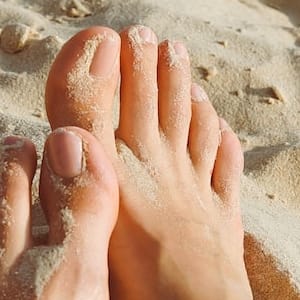out on one’s feet: Idiom Meaning and Origin
What does ‘out on one's feet’ mean?
The idiom "out on one's feet" means to be extremely tired or exhausted, to the point of not being able to continue or function properly.

Idiom Explorer
The idiom "run someone off their feet" means to keep someone extremely busy or overwhelmed with work or tasks.
The idiom "run on fumes" means to continue doing something or functioning even though one has little energy, resources, or fuel left.
The idiom "run on empty" means to continue doing something despite having no energy, resources, or motivation left.
The idiom "put one's feet up" means to relax or take a break from work or daily responsibilities. It refers to the action of resting one's feet on a surface, typically a chair or ottoman, to unwind and unwind.
Put one's feet up is an idiom that is commonly used in the English language. It is typically used to describe the action of relaxing or resting, often by sitting or lying down with one's feet elevated or propped up on something.
The idiom "out of one's mind" means to be mentally deranged or insane.
The idiom "out of one's element" means to be in a situation or place where one feels uncomfortable or is not able to perform as well as usual.
The idiom "out of gas" means to have no more energy, enthusiasm, or motivation to continue doing something. It can also refer to a situation where a vehicle has run out of fuel and is unable to continue running.
The idiom "out cold" means to be unconscious, usually from a blow to the head or excessive fatigue. It implies a complete loss of consciousness and the inability to respond or awaken.
Meaning Unveiled
The idiom "out on one's feet" is commonly used in American English to describe someone who is physically or mentally exhausted, to the point where they can barely function. The origins of this idiom can be traced back to the early 20th century, but its exact origins are unclear.
One theory suggests that the idiom may have originated from the sport of boxing, where the term "knockout" is commonly used. When a boxer is knocked out, they are unable to continue the fight, often falling to the ground and needing assistance to stand up. This correlation between being unable to stand and being completely exhausted could have given rise to the idiom "out on one's feet". However, there is no definitive evidence to support this theory.
Another possible origin of this idiom could be related to the phrase "knock someone off their feet". This phrase means to surprise or impress someone greatly. It is possible that "out on one's feet" developed as an extension of this phrase, suggesting that someone is so tired that they are completely taken aback and unable to function properly.
The unique combination of the words "out" and "feet" in this idiom creates a vivid image of someone who is so tired that they can no longer stand or walk properly. It implies a complete loss of energy and motivation. The phrase can be used in various contexts, not limited to physical fatigue, but also emotional and mental exhaustion.
As with many idioms, "out on one's feet" has evolved over time and is now used more figuratively than literally. It can be used to describe a range of situations where someone is exhausted and unable to continue with their normal activities.
An idiom related to "out on one's feet" is "on one's feet". This phrase is used to describe someone who has recovered from a difficult or challenging situation and is back to functioning normally. It implies a sense of resilience and the ability to bounce back from adversity.
Another related idiom is "out of one's element". This phrase is used to describe someone who is in a situation or environment that is unfamiliar to them, causing them to feel uncomfortable or out of place. It is the opposite of feeling "in one's element", which means to feel comfortable and confident in a given situation.
These related idioms highlight different aspects of being "out on one's feet". While "on one's feet" focuses on recovery and resilience, "out of one's element" emphasizes feeling uncomfortable and out of place.
Overall, the idiom "out on one's feet" is a phrase that describes extreme exhaustion and fatigue. Its exact origins may be uncertain, but it is commonly used in American English to convey a sense of complete physical or mental exhaustion. With the use of the words "out" and "feet", it creates a vivid image of someone who is so tired that they can barely stand or walk. This idiom has likely developed over time and is now used more figuratively to describe a variety of situations. Its usage is well-known among native English speakers in the United States, and it continues to be a widely understood expression.
Example usage
1. After working back-to-back shifts, Sarah was completely exhausted and felt like she was out on her feet.
2. The boxer was clearly out on his feet after taking several hard hits to the head.
3. During the marathon, Michael had been running for hours and was so tired that he was practically out on his feet.
More "Fatigue" idioms

